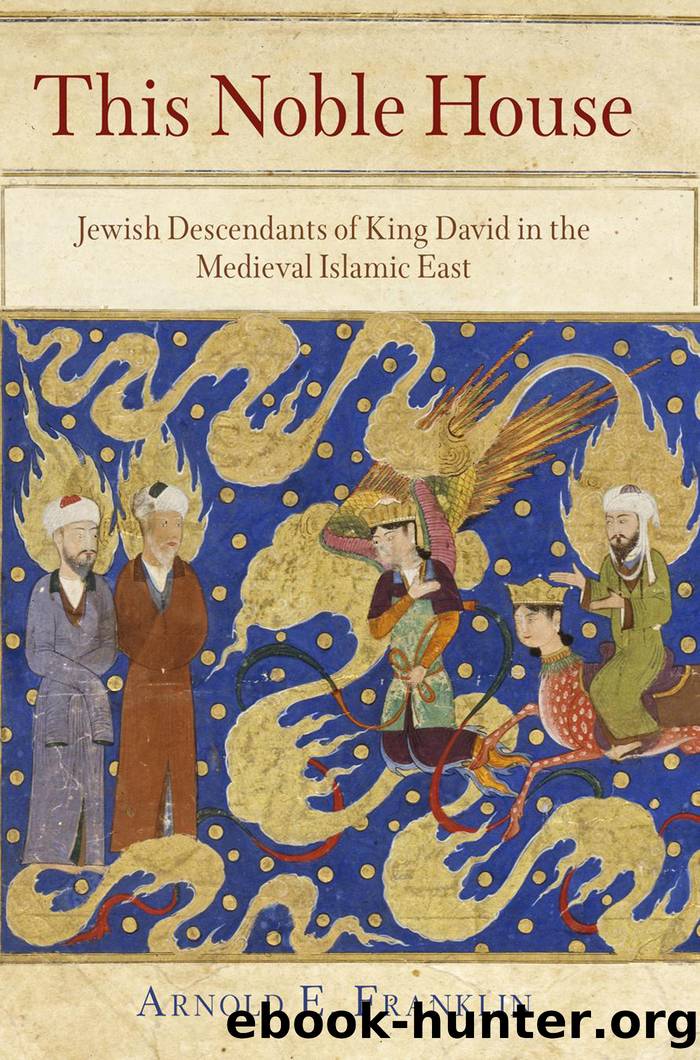This Noble House by Franklin Arnold E.;

Author:Franklin, Arnold E.;
Language: eng
Format: epub
Publisher: University of Pennsylvania Press
Published: 2019-08-15T00:00:00+00:00
Liturgical Expressions
Messianic anticipation in its various forms evolved from an ancient Jewish belief in a redeemer from the line of David who would gather the Jewish exiles, rebuild the Jerusalem temple, and restore the ancient monarchy of Israel. For Rabbanite Jews especially, this complex of ideas, elaborated in rabbinic works from late antiquity, was regularly reinforced through its incorporation in the daily prayer service. The Talmud itself stipulates the recitation of certain prayers on behalf of the Davidic monarchy, and liturgical texts preserved in the Geniza reflect how such normative regulations were put into practice.
Versions of the weekday Ê¿amida prayer discovered in the Geniza express a yearning for the messianic age through a variety of formulations. According to the rite of the Palestinian congregation in Fustat, the fourteenth benediction of the Ê¿amida combined a plea for the rebuilding of the city of Jerusalem with a call for the restoration of the Davidic monarchy in the messianic age:
Have compassion O Lord, our God, in Your abundant mercy,
On Israel, Your people, and on Jerusalem, Your city,
On Zion, the abode of Your glory,
And on the kingdom of the son of David, Your anointed.
Blessed are You, O Lord, God of David, rebuilder of Jerusalem.45
Babylonian versions of the Ê¿amida contained a separate benediction devoted exclusively to the theme of the Davidic savior:
Now cause the shoot of David to flourish,
And raise his horn high in Your salvation.
Blessed are You, O Lord, who causes the horn of salvation to flourish.46
And a prayer for the reinstatement of the Davidic line was also routinely incorporated into the benedictions following the recitation of the hafá¹ara, the lection from the Prophets read on Sabbaths and festivals.47 Given these liturgical formulations it would be unwise to discount the emotional effect that prayer in the presence of living members of the House of David could have generated for medieval worshipers. When an anonymous individual describes in a short note of only ten lines the visit of âour lord, the nasiâmay his honor be magnifiedâ to the Babylonian synagogue in Fustat, he is likely reflecting some of the thrill that would have naturally accompanied such intersections of textual tradition and social reality.48
A similar call for the restoration of the Davidic monarchy was included in the third benediction of the Grace after Meals. A version of this blessing found in the Geniza reads: âHave mercy, O Lord our God, upon us and upon Your people Israel ⦠and upon the kingdom of the House of David, Your anointed oneâspeedily may You restore it to its place.â49 In an alternate version the messianic motif is even more pronounced: âHave mercy, O Lord our God ⦠rescue us speedily from our misfortunes and cause us not to rely on the charity of men, for their charity is meager and their shame is great. Rather, do we trust in Your holy name, which is great and awesome, and may Elijah and the messiah, son of David, come in our lifetime.â50
In other cases, messianic meaning could be read into the language of a more ambiguous liturgical text.
Download
This site does not store any files on its server. We only index and link to content provided by other sites. Please contact the content providers to delete copyright contents if any and email us, we'll remove relevant links or contents immediately.
| Haggadah | Hasidism |
| History | Holidays |
| Jewish Life | Kabbalah & Mysticism |
| Law | Movements |
| Prayerbooks | Sacred Writings |
| Sermons | Theology |
| Women & Judaism |
The Secret Power of Speaking God's Word by Joyce Meyer(2748)
Man's Search for Meaning by Viktor E. Frankl(2554)
Mckeown, Greg - Essentialism: The Disciplined Pursuit of Less by Mckeown Greg(2329)
MOSES THE EGYPTIAN by Jan Assmann(2275)
Devil, The by Almond Philip C(2202)
Unbound by Arlene Stein(2177)
The Complete Dead Sea Scrolls in English (7th Edition) (Penguin Classics) by Geza Vermes(2135)
I Capture the Castle by Dodie Smith(1904)
Schindler's Ark by Thomas Keneally(1758)
The Invisible Wall by Harry Bernstein(1704)
The Gnostic Gospel of St. Thomas by Tau Malachi(1674)
The Bible Doesn't Say That by Dr. Joel M. Hoffman(1606)
The Secret Doctrine of the Kabbalah by Leonora Leet(1526)
Political Theology by Carl Schmitt(1500)
The Jewish State by Theodor Herzl(1466)
A History of the Jews by Max I. Dimont(1439)
The Dead Sea Scrolls Bible by Martin G. Abegg(1423)
The Book of Separation by Tova Mirvis(1419)
Oy!: The Ultimate Book of Jewish Jokes by David Minkoff(1293)
